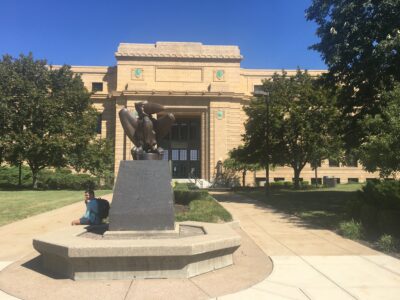KU expected to ‘figure out’ wage increases, despite governor’s tuition cap; engineering students may see 70% fee hike

photo by: Kim Callahan/Journal-World
Strong Hall on the University of Kansas campus is pictured in September 2021.
Kansas’ governor has vetoed planned tuition increases for the University of Kansas and other state universities, but KU leaders said they still expect to be able to fund a 5% wage increase for most employees.
“We will figure it out,” KU Chancellor Douglas Girod said in a brief interview with the Journal-World. “That is still our intent to figure out how to do that.”
KU leaders on Wednesday had planned on asking the Kansas Board of Regents to approve a 1.1% tuition increase for the next school year. But late on Monday, Kansas Gov. Laura Kelly vetoed a provision from the Kansas Legislature that had lifted a cap on tuition rates. Because she vetoed the provision, the cap remains in place, and KU and other state universities had to withdraw their requests for tuition increases.
The proposed tuition increase was meant to partially fund wage increases for students and staff. But KU leaders on Wednesday expressed confidence they would be able to find other ways to fund the wage increases, which they said are critical in retaining and attracting employees.
“We are struggling to hire,” Jeff DeWitt, chief financial officer for KU, told a Regents committee on Wednesday.
KU and other Regents schools received significant amounts of new state funding in the recently approved budget. The amount approved by the Legislature, however, was slightly less than what Kelly had recommended in her budget. KU and all of the other state universities were proposing tuition increases to make up the difference — about $3 million in KU’s case — between the governor’s recommended budget and the approved budget.
KU leaders now expect to fund the wage increases using reserve funds, and will further bank on future enrollment increases to help replenish those reserve funds in outlying years.
Students at KU now can expect to see their tuition bills hold steady next year. But some students will learn there is a big difference between saying tuition is holding steady and having actual total cost of attendance hold steady.
Engineering students at KU could face more than a $1,000 increase to attend KU next year. That’s because KU is proposing an approximately 70% increase in fees that engineering students are required to pay. Under the proposal, the engineering fee would increase to $95 per credit hour, up from $54.70 per credit hour currently.
In an example provided to the Regents, a typical junior in the engineering school’s computer science major would see a $1,209 increase in required fees next school year, if the proposal is approved.
The Regents on Wednesday heard the tuition and fee proposals but did not take any final action on the requests. They are scheduled to do so next month. Regents expressed both support and concern about the engineering fee increase.
Regent Carl Ice said KU’s proposed engineering fees likely were appropriate given that the new fees would be roughly equal to what engineering schools at Wichita State and Kansas State charge. But Ice expressed concern that the increases hadn’t been made more gradually over a period of years.
“It would seem that we would want to avoid making 60% or 70% increases in a year,” Ice said.
DeWitt agreed, but said a recent review of the engineering school convinced him that the current fees were not covering the costs of instruction that the engineering school currently incurs. The proposed fee increase is expected to generate about $1.8 million to help pay graduate teaching assistants, purchase laboratory equipment and fund other instructional expenses.
Some Regents questioned whether the fee increase was necessary, given that the Legislature has made special appropriations to support engineering education. Girod, though, said much of that money in KU’s case has gone toward improving buildings and infrastructure related to KU’s engineering facilities. Those investments have helped increase engineering enrollment, but the additional students require additional “people dollars” to fund teaching salaries and other instructional expenses, Girod said.
“This really will be about people and pay,” Girod said of the fee increase.
Regents also heard recommendations related to KU’s general student fees, which are charged to all students regardless of their majors. The total amount of fees charged at KU is proposed to increase by just 65 cents per semester next school year. Instead of proposing increases in the total fees, a student-led committee recommended that the total fee remain basically flat but that the amount of fee money going to organizations and departments be redistributed.
On that front, the KU committee is recommending several changes:
• KU recreation services would receive a $5 fee increase to help increase student employee wages in the department.
• KU transportation services would see a $4 decrease, which likely would require transportation services at KU to reevaluate routes and services provided, the Regents were told.
• Diversity education programming and support would receive a $2.30 fee increase to fund additional staff and programming.
• Student health and wellness would see a $1.65 fee decrease. The department would use reserve funds and find new efficiencies, the Regents were told.
The Regents are expected to take final action on those fee recommendations next month.







